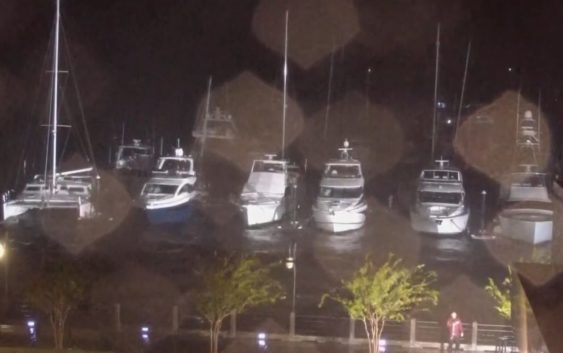- Caught on camera | Tornado touches down in Missouri
- Carolina Hurricanes playoff tickets go on sale next week
- Weather Impact Alert: Cold front could trigger severe weather in Houston area this weekend | See timeline
- Violent storms cut through the South and Midwest, spawning tornadoes and killing 3
- Above-normal active 2025 hurricane season predicted by Colorado State University
‘Catastrophic’ freshwater flooding expected over Carolinas

By JONATHAN DREW, Associated Press
WILMINGTON, N.C. (AP) — Hurricane Florence already has inundated coastal streets with ocean water and left tens of thousands without power, and forecasters say that “catastrophic” freshwater flooding is expected over portions of the Carolinas as Hurricane Florence inches closer to the U.S. East Coast.
Screaming winds bent trees toward the ground and raindrops flew sideways as Florence’s leading edge whipped the Carolina coast Thursday to begin an onslaught that could last for days, leaving a wide area under water from both heavy downpours and rising seas.
The storm’s intensity diminished as it neared land, with winds dropping to around 90 mph by nightfall. But that, combined with the storm’s slowing forward movement and heavy rains, had Gov. Roy Cooper warning of an impending disaster.
“The worst of the storm is not yet here but these are early warnings of the days to come,” he said. “Surviving this storm will be a test of endurance, teamwork, common sense and patience.”
Cooper requested additional federal disaster assistance in anticipation of what his office called “historic major damage” across the state.
More than 80,000 people were already without power as the storm began buffeting the coast, and more than 12,000 were in shelters. Another 400 people were in shelters in Virginia, where forecasts were less dire.
Prisoners were affected, too. North Carolina corrections officials said more than 3,000 people were relocated from adult prisons and juvenile centers in the path of Florence, and more than 300 county prisoners were transferred to state facilities.
Officials said some 1.7 million people in the Carolinas and Virginia were warned to evacuate, but it’s unclear how many did. The homes of about 10 million were under watches or warnings for the hurricane or tropical storm conditions.
Spanish moss waved in the trees as the winds picked up in Wilmington, and floating docks bounced atop swells at Morehead City. Ocean water flowed between homes and on to streets on the Outer Banks; waves crashed against wooden fishing piers.
Coastal towns in the Carolinas were largely empty, and schools and businesses closed as far south as Georgia.
As of 2 a.m., Florence was centered about 35 miles east of Wilmington, North Carolina. Its forward movement increased slightly to 6 mph. Hurricane-force winds extended 90 miles from its center, and tropical-storm-force winds up to 195 miles.
A buoy off the North Carolina coast recorded waves nearly 30 feet high as Florence churned toward shore.
Forecasters said conditions will deteriorate as the storm pushes ashore early Friday near the North Carolina-South Carolina line and makes its way slowly inland. Its surge could cover all but a sliver of the Carolina coast under as much as 11 feet of ocean water, and days of downpours could unload more than 3 feet of rain, touching off severe flooding.
Once a Category 4 hurricane with winds of 140 mph, the hurricane was downgraded to a Category 1 on Thursday night.
Forecasters said that given the storm’s size and sluggish track, it could cause epic damage akin to what the Houston area saw during Hurricane Harvey just over a year ago, with floodwaters swamping homes and businesses and washing over industrial waste sites and hog-manure ponds.
The hurricane was seen as a major test for the Federal Emergency Management Agency, which was heavily criticized as slow and unprepared for Hurricane Maria in Puerto Rico last year.
As Florence drew near, President Donald Trump tweeted that FEMA and first responders are “supplied and ready,” and he disputed the official conclusion that nearly 3,000 people died in Puerto Rico, claiming the figure was a Democratic plot to make him look bad.
Not everyone was taking Florence too seriously: About two dozen locals gathered Thursday night behind the boarded-up windows of The Barbary Coast bar as Florence blew into Wilmington.
“We’ll operate without power; we have candles. And you don’t need power to sling booze,” said owner Eli Ellsworth.
Others were at home hoping for the best.
“This is our only home. We have two boats and all our worldly possessions,” said Susan Patchkofsky, who refused her family’s pleas to evacuate and stayed at Emerald Isle with her husband. “We have a safe basement and generator that comes on automatically. We chose to hunker down.”
___
Associated Press writers Seth Borenstein in Washington; Jeffrey Collins in Myrtle Beach, South Carolina; Jennifer Kay in Miami; Gary Robertson in Raleigh, North Carolina; Sarah Rankin and Denise Lavoie in Richmond, Virginia; Meg Kinnard in Columbia, South Carolina; Skip Foreman in Charlotte, North Carolina; Jeff Martin in Hampton, Georgia; David Koenig in Dallas; Gerry Broome at Nags Head, North Carolina; and Jay Reeves in Atlanta contributed to this report.